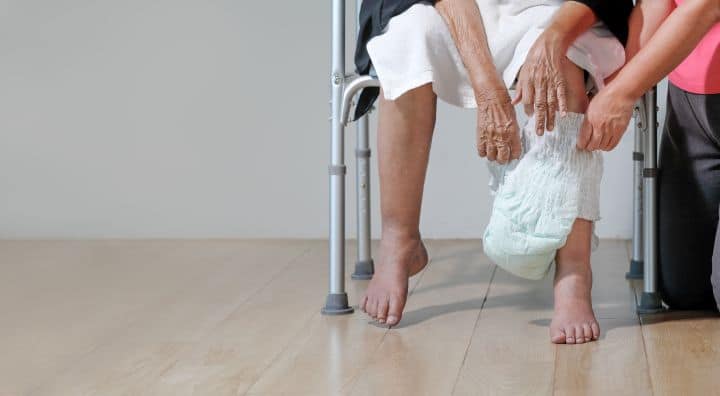Elderly incontinence is a common but difficult problem. Let us look at how to deal with elderly incontinence in detail.
Contents
Are you also dealing with seniors who suffer from incontinence and getting stressed over it? Well, incontinence is a medical condition under which the patient cannot control their bladder and other bowel functions.
In more detailed words, incontinence is a condition under which a person leaks urine by accident. Though it may happen at any age, incontinence is mainly associated with older people, especially among women.
This condition, unfortunately, can harm both the patient and the caretaker as well. It is a challenge that many people do not expect to take care of. Though incontinence is a treatable condition, many caregivers find it challenging to deal with such a situation.
Now, the question is, what causes bladder control issues? Well, the human body uses a bladder to store urine. Now, during urination, the bladder muscles tighten to move the urine into the tube called the urethra.
Around the same time, the urethra muscles relax and assist the urine in passing out of the body. However, if these muscles do not work correctly, it can cause the urine to leak due to an uncontrollable urine bladder. Incontinence is a medical condition when the urine leaks without any warning.
You may also like Best Bedpan For Elderly
What are the Different Causes of Urinary Incontinence?
Different reasons cause urinary incontinence. These include constipation, urinary tract infections, and vaginal infection. Even some medicines can cause these bladder issues, but they last for only a short period. Here are the reasons that may cause urinary incontinence for a more extended period:
- Overactive muscles of the bladder
- Weakened bladder muscles
- The blockage is caused due to enlarged prostate in men.
- Weakened muscles of the pelvic floor
- Damage caused to nerves controlling bladder due to different diseases such as Parkinson’s disease, Diabetes, Multiple Sclerosis, etc.
- Arthritis is also a common cause as it can cause a delay in going to the bathroom.
- A condition in which the pelvic organs shift from their usual place into the vagina.
Incontinence among men is caused due to the following reasons as well:
- Enlarged prostate gland
- Inflammation of the prostate gland
- Damage caused to the muscles of the bladder due to injury or surgery.
You may also like Best Incontinence Pads for Men
Diagnosis For Urinary Incontinence
A healthcare provider goes through these below-mentioned steps to diagnose Urinary Incontinence among elders:
- Performing a Urine culture and analysis to ensure there is no infection or blood in the patient’s urine.
- Performing blood tests to check the patient’s glucose levels, checking the patient’s kidney functions, and checking the calcium percentage.
- Getting a thorough evaluation of the patient’s medical history.
- Giving the patient a complete physical examination, including a urological examination for men and a pelvic examination for women.
Tips To Provide Effective Care for Elders Suffering From Incontinence
Offering help to the elders suffering from urinary incontinence can be consuming and exhausting. If the person suffers from some other medical condition, such as Dementia, it simply adds to the challenge.
Being a caregiver, it becomes essential to understand and recognize the situation and offer a sympathetic and effective solution. Well, here are some tips that can lend you a helping hand in offering effective care for the elders suffering from urinary incontinence:
Always check with the patient’s healthcare provider:
If you witness any new case of bladder incontinence, it is advisable to check with the patient’s healthcare provider. A physical examination done in the early stages can help the doctor understand the reason for incontinence and offer a solution.
Also, there may be an underlying medical condition, even though the symptoms may be just urinary incontinence. Lastly, visiting the healthcare provider from time to time ensures that the patient’s condition does not deteriorate any further.
Use clothes that are easy to wear and take off
Using clothes that are easy to wear and remove makes it easier for the patient to reach the toilet in less time with little chance of accidents. Also, if you need to help the patient with the clothes, it becomes easy to dress them down and then re-dress them again. Thus, jumpsuits or loose t-shirts with baggy pants having elastic waistbands are useful in such situations.
You may also like Best Absorbent Underwear for Adults
Be Prepared Always:
Incontinence does not mean that you or the patient cannot move out of the house. Just be prepared with a tote bag having supplies useful for incontinence. The bag can include:
- Pads.
- Briefs that are designed especially for incontinence.
- Cleansers
- A change of clothes for situations where you may need to change the patient’s clothes.
Incontinence doesn’t mean that your patient should be confined to home due to incontinence.
Empathy works well:
it is very important to have empathy for the patient. The reason is that losing control over one’s bladder is considered a stressful situation and can cause the patient to panic. Thus, it is advisable to approach this difficult situation with ample patience and try to ease the patient’s anxiety. Well, this may help you in reducing your anxiety levels as well.
You may also like How to Convince an Elderly Parent to Wear a Diaper
Diet Matters:
Make efforts to watch your patient’s diet as making changes in the diet can help in reducing the incontinence symptoms. Try to avoid food items, such as spicy foods, junk food, and unhealthy food items.
Be Ready To Accept Help
Accept the fact that being a caregiver, you need help. It is a fact that though caregivers are ready to go to any extent to help their patients, they may not be ready to accept any help. Though it is perfectly fine to establish caregiving boundaries, taking help from others in situations where needed can help your patient and you as well.
Encourage your patient
It will be helpful if you ask your patient for help whenever needed. Many patients may not find it a good idea to even recognize the fact that they need help. Thus, it becomes the caregiver’s responsibility to encourage the patient to get approval and feel that they contribute to the situation.
Follow a proper routine
Visiting the washroom for bathroom breaks at least four to five times is also helpful. However, try to be flexible as you deal with an elder who is already facing other health issues.
You may also like Best Diapers For Bedridden Patients
Tips For Effective Bladder Emptying
Emptying the bladder during a toilet visit is useful for incontinence patients. Complete bladder emptying ensures no bacteria remain in the bladder or the pelvic or vaginal muscles, thereby reducing any skin or urinary infections. Well, here are a few tips that can lend a helping hand to the incomplete emptying of the bladder.
Take your time:
Never rush things with the elderly suffering from incontinence. Ask the patient to take it easy. Extend help to the elderly in finding an effective posture for urinating while getting enough support from the feet and leaning forward. You can also assist them in reaching the position several times.
Demonstration helps:
If the elderly are also suffering from Dementia, the patient may simply forget how to use the washroom. In this case, it is useful to demonstrate how to urinate or how to use the seat.
Use a pillow:
A pillow can be useful in making the toilet seat highly comfortable for the elderly. Make sure that the pillow is flexible and soft.
Use Apps:
One can find many different apps that can easily replicate the sound of running water from a tap. These sounds help in case of voiding.
You may also like Best Bedside Commodes with Large Opening
Final Words
Incontinence is a challenging situation for a caregiver, especially if the patient is elderly. Thus, a person needs to take help from the tips mentioned above and apply them in everyday life. So, approach a professional and also use these tips to be better prepared for these situations.


